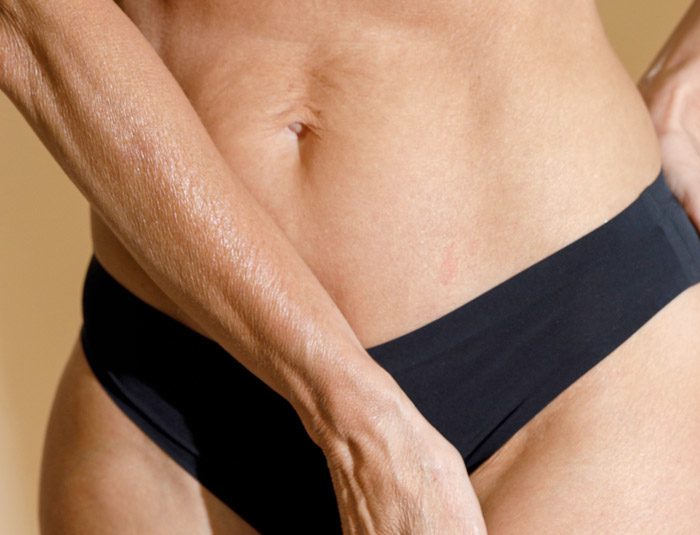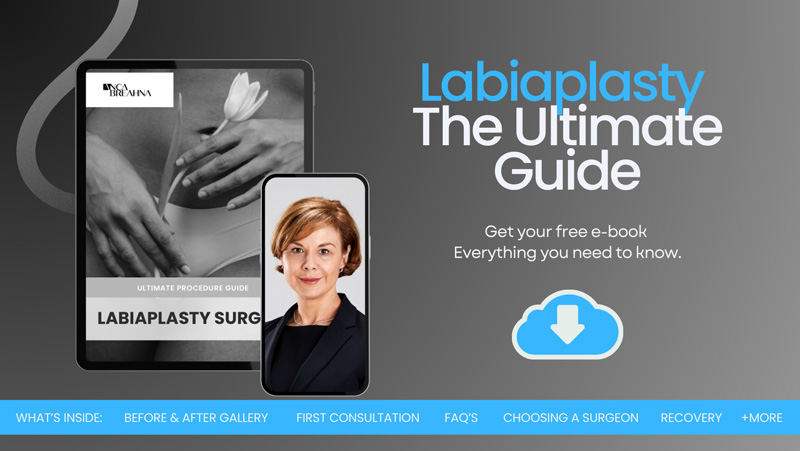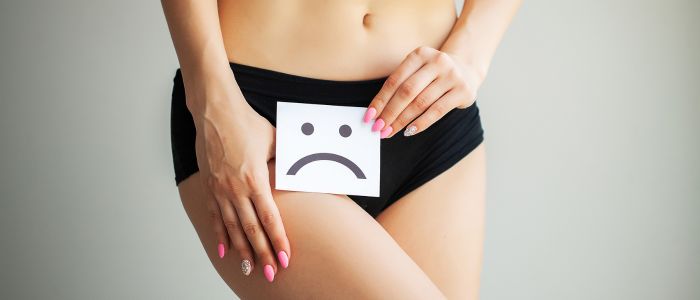
Table of Contents
- Effective Solutions for Vaginal Dryness: A Step-by-Step Guide
- Download the Labiaplasty Guide
- Causes of Vaginal Dryness
- Diagnosis and Assessment
- Treatments for Vaginal Dryness
- Over-the-Counter Treatments
- Prescription Treatments
- Desirial Injections for Vaginal Dryness
- Lifestyle Modifications and Self-Care to Alleviate Vaginal Dryness
- FAQs about Treatments and Solutions for Vaginal Dryness
- Further Reading about Cosmetic Procedures at Cheshire Cosmetic Surgery
Effective Solutions for Vaginal Dryness: A Step-by-Step Guide
Vaginal dryness is an uncomfortable and common condition, affecting around 17% of women aged 18-50 and over 50% after menopause. It occurs when the body doesn’t produce enough oestrogen leading to dryness and irritation in the vaginal area. Vaginal dryness can cause pain during intercourse, burning, itching, abnormal discharge, and even urinary symptoms.
In this blog, Chester Consultant Plastic Surgeon Anca Breahna explores the causes of vaginal dryness and provides effective solutions. You’ll learn about diagnosis and assessment methods, treatment options like vaginal moisturisers and low-dose oestrogen therapy, the potential benefits of Desirial injections, and helpful lifestyle modifications to alleviate symptoms of vaginal dryness.
Download the Labiaplasty Guide

Causes of Vaginal Dryness
Vaginal dryness can occur due to various factors that affect the body’s oestrogen levels and overall hormonal balance. The primary causes of vaginal dryness include:
- Menopause: As women approach menopause, their oestrogen levels naturally decline, leading to vaginal dryness and other symptoms like hot flashes and night sweats. Hormonal changes and ageing can reduce vulvar elasticity, prompting some women to explore solutions for a sagging vulva.
- Breastfeeding: During breastfeeding, oestrogen levels drop, which can contribute to vaginal dryness.
- Certain Medications: Some medications, such as antihistamines, antidepressants, and certain cancer treatments, can cause vaginal dryness as a side effect.
- Medical Conditions:
-
- Cancer Treatments: Radiation therapy and chemotherapy can damage the ovaries and lead to a decrease in oestrogen production, resulting in vaginal dryness.
- Diabetes: Poorly controlled diabetes can affect the body’s ability to produce natural lubricants, leading to vaginal dryness.
- Sjögren’s Syndrome: This autoimmune disorder can cause dryness in various areas of the body, including the vagina.
- Lack of Sexual Arousal: During sexual arousal, the body produces natural lubricants that help prevent vaginal dryness. However, if arousal is not achieved or maintained, vaginal dryness can occur.
- Environmental Factors: Using perfumed products around the vaginal area, such as soaps, douches, or hygiene sprays, can disrupt the natural pH balance and cause dryness.
It’s important to note that vaginal dryness can be a temporary or chronic condition, depending on the underlying cause. If you experience persistent vaginal dryness, it’s advisable to consult with a healthcare professional to determine the appropriate treatment options.
Diagnosis and Assessment
Symptoms of vaginal dryness include feeling sore or itchy in and around the vagina, pain or discomfort during sex, needing to urinate more often, and recurring urinary tract infections (UTIs).
To diagnose vaginal dryness, your healthcare provider will typically follow these steps:
- Medical History: They will ask about your symptoms, medical conditions, medications, and menstrual cycle history. This information helps identify potential causes of vaginal dryness.
- Physical Examination: Your healthcare provider will perform a pelvic exam to assess the condition of your vaginal tissues and check for signs of dryness, irritation, or infection.
- Diagnostic Tests:
-
- Vaginal pH Test: This test measures the acidity level of your vaginal discharge. An abnormal pH level can indicate an infection or other underlying condition contributing to vaginal dryness.
- Hormone Level Tests: Blood tests may be ordered to check your oestrogen and other hormone levels, especially if you are approaching menopause or have had your ovaries removed.
- Vaginal Discharge Testing: A sample of your vaginal discharge may be analysed to rule out infections or other conditions that could cause dryness.
Make sure to seek medical attention if vaginal dryness interferes with your daily activities, affects your sex life, or is accompanied by severe vaginal bleeding.
Treatments for Vaginal Dryness
There are various treatment options available to alleviate vaginal dryness and its associated symptoms. These include:
Over-the-Counter Treatments
- Vaginal Moisturisers: Products like Replens, Luvena, and KY Liquibeads can help replenish moisture in the vaginal area. They are designed to be used regularly, even when not engaging in sexual activity.
- Vaginal Lubricants: Water-based lubricants, such as Astroglide and KY Jelly, can provide temporary relief during sexual activity by reducing friction and discomfort.
- Natural Oils: Some women find relief by using natural oils like olive or coconut oil (for external use only) as a lubricant during sexual activity.
Prescription Treatments
- Low-Dose Oestrogen Therapy: This includes vaginal oestrogen creams, suppositories, rings, or tablets. These products can help improve vaginal dryness symptoms within a few weeks by restoring oestrogen levels in the vaginal area.
- Ospemifene (Osphena): An oral medication that acts as a selective oestrogen receptor modulator (SERM) and can help alleviate vaginal dryness and other symptoms associated with menopause.
- Dehydroepiandrosterone (DHEA) Vaginal Suppository: A prescription vaginal suppository that can help improve vaginal dryness by increasing oestrogen levels in the vaginal area.
It’s important to note that while vaginal oestrogen therapy is generally considered safe and effective, there are potential risks and benefits to consider, especially for women with a history of breast cancer. In such cases, it’s important to discuss treatment options with a healthcare provider to determine the most appropriate course of action.
Vaginal dryness treatments may need to be used continuously, as symptoms can return when the treatment is stopped, unless oestrogen production increases again. Additionally, some therapies like vaginal laser or energy-based devices have uncertain safety and efficacy for treating vaginal dryness.
Desirial Injections for Vaginal Dryness
Desirial is a novel, non-oestrogen treatment option for vaginal dryness. It is a hyaluronic acid-based injectable gel that helps restore moisture and elasticity to the vaginal walls. Here’s what you need to know about Desirial injections:
- How it Works: Desirial is a biocompatible gel that contains cross-linked hyaluronic acid, a naturally occurring substance found in the body. When injected into the vaginal walls, it helps to hydrate and plump the tissue, reducing dryness and improving lubrication.
- Administration: Desirial is administered through a series of injections into the vaginal walls. The procedure takes approximately 15-20 minutes. Local anaesthesia may be used to minimise discomfort during the injections.
- Benefits:
-
- Provides long-lasting relief from vaginal dryness, typically lasting up to 12 months
- Improves vaginal elasticity and lubrication
- Non-hormonal treatment option suitable for women who cannot or prefer not to use oestrogen -based therapies
- Minimally invasive procedure with minimal downtime
- Potential Side Effects: As with any medical procedure, there are potential side effects associated with Desirial injections. These may include mild to moderate pain or discomfort during and after the procedure, swelling or bruising at the injection site, temporary spotting or bleeding and rare cases of infection or allergic reactions.
It’s important to discuss the risks and benefits of Desirial injections Anca to determine if this treatment option is suitable for your individual needs and circumstances.
Vaginal dryness can significantly impact a woman’s quality of life, and Desirial injections offer a promising non-hormonal solution. However, as with any medical treatment, it’s crucial to consult with an experienced plastic surgeon to ensure the safety and effectiveness of this approach for your specific situation.
Lifestyle Modifications and Self-Care to Alleviate Vaginal Dryness

Adopting certain lifestyle modifications and self-care practices can help alleviate vaginal dryness and promote overall vaginal health. Here are some effective strategies to consider:
- Incorporate Natural Remedies
-
- Use oils like grape seed, olive, vegetable, sunflower, or coconut oil externally as natural lubricants.
- Increase sexual stimulation and foreplay to promote natural lubrication.
- Maintain a Healthy Diet
-
- Eat a diet rich in vitamin C to support collagen production and keep vaginal tissue strong and healthy. Good sources include red peppers, broccoli, cabbage, kale, and fresh parsley.
- Consume foods rich in essential fatty acids, such as omega-3 from oily fish, flax seeds, walnuts, and almonds, to promote natural lubrication and support cell membrane integrity.
- Include phytoestrogen -containing foods like fermented soy products (miso, tempeh, natto), lentils, chickpeas, fennel, and flax seeds, which may help relieve vaginal dryness.
- Stay well hydrated by drinking the equivalent of 6-8 glasses of water per day, including herbal teas and water-rich fruits and vegetables, to maintain vaginal tissue elasticity.
- Limit intake of refined sugar, which can degrade collagen through glycation and contribute to skin ageing and dryness.
- Lifestyle Habits
-
- Quit smoking, as it decreases oestrogen levels and increases the risk of vaginal atrophy.
- Stay sexually active, as it increases blood flow to the genitals and helps keep them healthy.
- Avoid perfumed products like powders, soaps, and deodorants, as they can irritate the vagina.
- Exercise regularly to aid hormone balance.
- Vaginal Care
-
- Use natural lubricants like jojoba, coconut oil, aloe vera, and vitamin E suppositories to soothe and lubricate the genital area.
- Consider probiotics, as limited research suggests they may help relieve symptoms of vaginal atrophy.
- Try over-the-counter water-based, glycerine-free lubricants and vaginal moisturisers for relief.
- Avoid douching and fragranced products, wash with warm water only, wear cotton underwear, and avoid thongs and synthetic fabrics.
- Sexual Activity
-
- Have regular sex with adequate foreplay and arousal to maintain vaginal health.
- Eat foods with phytoestrogens like soy, nuts, seeds, berries, and tofu, which may help relieve vaginal dryness.
FAQs about Treatments and Solutions for Vaginal Dryness

Who is a good candidate for Desirial injections?
Women experiencing symptoms of vaginal dryness, irritation, laxity, or discomfort during intercourse may benefit from Desirial injections. It’s particularly beneficial for postmenopausal women, those who have undergone cancer treatments affecting oestrogen levels, or women experiencing changes after childbirth. For a deeper understanding of post-pregnancy recovery and treatment options, check out our detailed guide on Vaginal Rejuvenation after Pregnancy: An Overview of Options and Benefits. A thorough consultation with Anca is necessary to determine if Desirial is the right option.
What can I expect during the Desirial treatment process?
The treatment process usually involves a consultation with Anca to discuss symptoms and goals. During the procedure, a topical anaesthetic may be applied to the treatment area to minimise discomfort. The Desirial hyaluronic acid gel is then carefully injected into the targeted areas around the vagina. The procedure is relatively quick, typically taking around 30 minutes, and you can often return to their normal activities shortly after.
Are there any side effects or risks associated with Desirial injections?
As with any medical procedure, there are potential risks and side effects, although they are generally minimal with Desirial injections. Some patients may experience temporary swelling, redness, or bruising at the injection sites. In rare cases, infection or allergic reaction could occur.
How long do the effects of Desirial injections last?
The effects of Desirial injections can vary depending on the individual’s response to the treatment. Many women report improvements in symptoms for up to 12 months following the procedure. The treatment is not permanent, and repeat sessions may be necessary to maintain the desired results. Anca and her team can offer guidance on how often you might need follow-up treatments based on your specific situation and response to the initial treatment.
Are there over-the-counter solutions for vaginal dryness?
Yes, there are several over-the-counter (OTC) solutions available, including vaginal moisturisers and lubricants. Moisturisers are designed for regular use to help maintain vaginal moisture, while lubricants are typically used to reduce discomfort during sexual activity.
Can diet and lifestyle changes help with vaginal dryness?
Yes, certain diet and lifestyle changes can help. Staying hydrated by drinking plenty of water, eating foods rich in phytoestrogens (such as soy products), and including omega-3 fatty acids in your diet can be beneficial. Avoiding smoking and reducing stress through relaxation techniques can also help improve symptoms.
How does hormone replacement therapy (HRT) affect vaginal dryness?
Hormone replacement therapy (HRT) can alleviate vaginal dryness by replacing the hormones that are at lower levels, such as during menopause. HRT can be systemic (affecting the whole body) or local (affecting only the vaginal area). It’s important to discuss the benefits and risks of HRT with a healthcare provider.
Can regular sexual activity help prevent vaginal dryness?
Regular sexual activity can help maintain healthy vaginal tissues by improving blood flow to the area. This can help prevent dryness and atrophy. Using a lubricant during sexual activity can also help reduce discomfort caused by dryness.
Medical References about Treatments and Solutions for Vaginal Dryness
Further Reading about Cosmetic Procedures at Cheshire Cosmetic Surgery
- Read more about Desirial Injections
- Read more about Dermal Fillers
- Read more about Lip Fillers
- Read more about Labiaplasty
- Read more about Skin Relaxing Injections
- Read more about Wedge Technique for Labia Minora Reduction
- Read more about Treatments and Solutions for Lines & Wrinkles
- Read more about Treatments and Solutions for Excess Fat
- Read more about Treatments and Solutions for Skin Moles
- Read more about Treatments and Solutions for Thin Lips
- Read more about How to Combat Dry Skin and Wrinkles During Menopause







